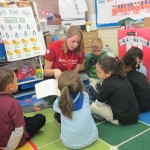It’s one thing to learn a skill in a class. It’s another to practice it in the real world, where conceptual lines are blurrier than they are in textbooks. It’s a distinction that leads many professional training programs to feature internships, which some may call clinical experiences of practicums, to complement the skills students learn in class. It is one that led the University of Connecticut’s Administrator Preparation Program (UCAPP) to reexamine internships when it began revamping its offerings to strengthen principal training.
Violet Jiménez Sims, a faculty member in the Neag School and New Britain Schools board of education member, comments on the board’s vow of inclusion in response to George Floyd’s death.
“As we piece together what the new normal might look like in our high schools, we should take advantage of this disruption to reconfigure the many moving parts that have been used as excuses for maintaining the status quo,” says Michele Back, an assistant professor of secondary and world languages education in UConn’s Neag School of Education.
We recently spotted a great quote from James C. Kaufman, a Professor of Educational Psychology at the University of Connecticut that said: “If creativity is a light, it does not have an on/off switch.”
Students need to feel safe and have supportive relationships for their social, emotional, and academic learning to be optimized. Students experiencing trauma, such as from public health crises, weather disasters, or other upsetting events, may have been exposed to unpredictable schedules, inconsistent supervision, or food insecurity and desperately need school to be their safest, most predictable, and most positive setting, especially if they have been displaced or are without utilities or basic comforts.
The University of Connecticut’s Administrator Preparation Program (UCAPP) aims to be a leading leadership program—with a curriculum that guides its students through rigorous, relevant learning experiences so they are prepared to serve as leaders and champions of equity on their first day on the job.
In this post, Dr. Richard Gonzales, director of the university’s educational leadership preparation programs, describes why the university decided to participate in the initiative, its general approach to the work, and the effects it is seeing so far. Other posts include descriptions of efforts to redesign curricula and internships, students’ and faculty members’ views about the new design, and the ways in which the university works with community partners to ensure it is meeting their needs.
University of Connecticut psychology professor James C. Kaufman, an expert in creativity research, in a Psychology Today post, sees people sheltering in place exhibiting “an increase in everyday creativity.” Although he lists a hierarchy of creative achievements, from “the family singing a song from ‘Les Miserables’” to publishing a “book about kiwi cultivation,…it is important not to let such a comparison diminish their value.”
Since schools shut down, students have been called the “hobbled” generation and the “covid class.” They have been told they have or will experience covid-related slides, losses, gaps and other deficiencies that are “disastrous.” They have been told that they are frying their brains by using phones, tablets and other devices to stay connected to friends, culture and a sense of normalcy, and that they are learning less than they should or close to nothing at all.
They should be told the opposite.
Host Danielle Scorrano invites READ listeners to enter the classroom with Devin Kearns, Ph.D. Kearns, a former teacher, is an expert in educational research and a professor of special education at the University of Connecticut. Kearns shares his expertise about dyslexia, dispels its pervasive myths, and presents research on reading.


